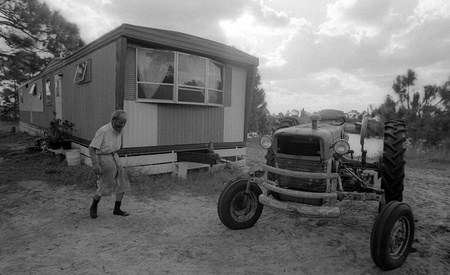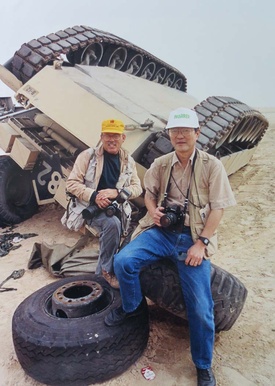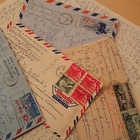Take time to get to know each other
Suwa-san's impression of Suketsugu was that he was "a really nice and kind person." But he was secretly astonished by his appearance. He was wearing a dirty shirt and shorts, had unkempt thinning hair, and a shaggy beard like thin wire. The inside of the long, narrow trailer house with four rooms was just filthy.
After that, I visited Sukeji several times during my days off, without my camera, to ask him about pineapple cultivation. The trailer house had a fan but no air conditioning, and the door was always open. There was a normal bed, but it didn't seem to be used, and he always slept and woke up in the small bed.
On the dirty table, bottles of Nescafe instant coffee, condiments, aluminum plates, etc. were placed in a mess. At the entrance, what looked like bonsai-style pine trees were placed in pots and buckets. Although they live an isolated life like in the forest, people still came to buy pineapples and bananas directly from the fields.
Mr. Suwa felt sorry for Sukeji when he saw his dirty room and the way he was living. He wished someone could look after him, and so he decided to at least clean up the place with the help of his wife.
When he told Sukeji about this, he said it was fine, so he brought his wife and four-year-old daughter over to help clean up. Sukeji was also friendly towards Mr. Suwa's wife, and was delighted with his daughter, telling her many times that she was a "cute boy."
After about four months of making these visits, Mr. Suwa
"It's rare for someone to come here from Japan like you and leave such a large amount of land behind, so I was really hoping I could take some photos," I began. "OK," Sukeji readily and happily agreed.
Once filming began, Suwa would sometimes be with Sukeji all day, starting at 4am, pressing the shutter continuously. In the morning, Sukeji would get up from bed, have breakfast, then load wooden boxes of pineapple seedlings onto the back of a Ford tractor and drive off to the fields to plant them. Suwa would ride behind him, but one day on a bumpy road the wheels hit something, causing the vehicle to shake violently and Suwa would fall backwards onto the road. For a moment it was so painful he could hardly breathe, but Sukeji, driving right in front of him, continued on his way unaware of this.
Suwa finally got up, chased after him and somehow managed to jump onto the tractor. When they arrived at their destination, Sukeji carried the wooden box out with a slightly bent back and placed it in a field the size of a football field that had been created in an area that had been cleared from the forest. The arms holding the box were thick for his body, with prominent veins, and his large hands as he planted the saplings, whose leaves had thorny edges, were wrinkled, the joints bulging, and the fingertips so swollen that they partially hid the nails.
He plants the plants at his own pace, but perhaps because it is suited to working in sandy soil, Sukeji moves around in socks rather than shoes. He works at his own pace with a carefree air, and at lunchtime, without eating, he takes out a bottle of strong whiskey with the label "MD-2020" and takes a sip. He then lies down in the shade of a tree and falls asleep. As he does so, Sukeji's small dog comes up to him, right in front of his nose.
After an hour or so he got up and went back into the fields, where he worked until dark, then drove off on his tractor. When he was not working in the fields he sat reading in the drawing room of the tray house.
Sukeji had already donated a large amount of land he owned to his hometown of Palm Beach County, and when he turned 89 during the interview, the commissioners of Palm Beach County came to celebrate with a birthday cake. Sukeji, who was wearing an orange shirt and brown trousers, even dozed off in the middle of a conversation with the visitors. Sukeji spoke enthusiastically about Japanese food, saying, "I like any kind of fish."
Whenever Suwa-san passed by Sukeji on other business trips, he would drop in. The photo shoot ended about eight months after the first visit.
Just over two months later, on February 29, 1976, Morikami Sukeji passed away at the age of 89. Upon learning of Sukeji's death on his way home from covering a tennis tournament, Suwa presented his boss with all the photos he had taken.
Planting pineapple seedlings in a sandy field; lying down beside the field with a dog nuzzling him; standing in front of a small electric fan inside a trailer house - the black-and-white composite photographs capturing various aspects of Suketsugu's life were soon featured in newspapers.
Flying to Philadelphia
Shortly after this, Suwa received a call from the photo editor of the Philadelphia Inquirer, a traditional newspaper in eastern Pennsylvania. He was invited to work there. Due to his busy schedule, he didn't know what kind of newspaper it was, and when he saw the sample stack of newspapers they sent him later, he wasn't very impressed with the printing, handling of photos, or the design.
But then in October, the call came again.
"They said they had left my plane ticket at the airport and asked me to come and see it. Okay, let's go since it would be a free trip and a vacation. They put me up in a nice hotel and the photographers were very kind. I thought if they were doing all this for me, I might as well come. My salary would increase a lot too," says Suwa.
Suwa decided to leave Florida and work for the Philadelphia Inquirer, arriving there in July 1977.
To be a good photographer, you need to be a good person
Since then, he has worked as a photographer for the paper, traveling to various locations and capturing a wide range of events. Looking back on his many years of experience in reporting, Suwa said the following.
"In the past, I have traveled to Europe, Africa, South America, Brazil, China, the Philippines, and other places for reporting. I covered the Nagano Olympics and also went to cover wars. I once photographed Gaddafi in Libya. Before the US bombings, I was somehow taken to a secret meeting in Tunisia on Gaddafi's private plane. I was amazed. It was an exclusive job for the Philadelphia Inquirer.
When I covered a drug trafficking scene in Colombia, I was guarded by police officers riding in the front and back of the car with machine guns. It seems that American media personnel are prone to kidnapping.
The most difficult time was when I went to China. I couldn't get a visa, so I went to Hong Kong on a tourist visa. I went there as a graphic artist because photographers attract attention. I was followed, and had to change taxis two or three times, and I didn't even get in the car in front of the hotel. I entered the women's dormitory without permission while the security guard was taking a nap to take pictures of how students at Peking University live, but I was caught and put in a detention center. It was a tough thing to do. I left Shanghai, but it was scary.
The most enjoyable experience was when I interviewed children born to American soldiers and Vietnamese women, and followed them when they came to the U.S. We would still talk on the phone for years to come.
Nowadays, newspapers are in a bad state and don't send their reporters abroad, but in the past, they flew all over the place. I once went to France to shoot an exhibition of Chagall in Philadelphia. I worked at the newspaper company when it was at its best.
Sometimes we had interns come, and I would tell them that the best photographer is not necessarily the one with the best skills. The most important thing is to be a good person. If you do that, you will be given opportunities. Even if you are not technically skilled, you can take exclusive photos. No matter how good your skills are, if you are disliked, you will not be given those opportunities. So be a good person."
Suwa retired from the Philadelphia Inquirer after 37 years in 2015 and continues to work as a freelancer in the United States.
(Titles omitted)
(Note) Reference: "Yamato Colony: The Men Who Left Japan in Florida" (by Ryusuke Kawai, Shunposha)
© 2020 Ryusuke Kawai








